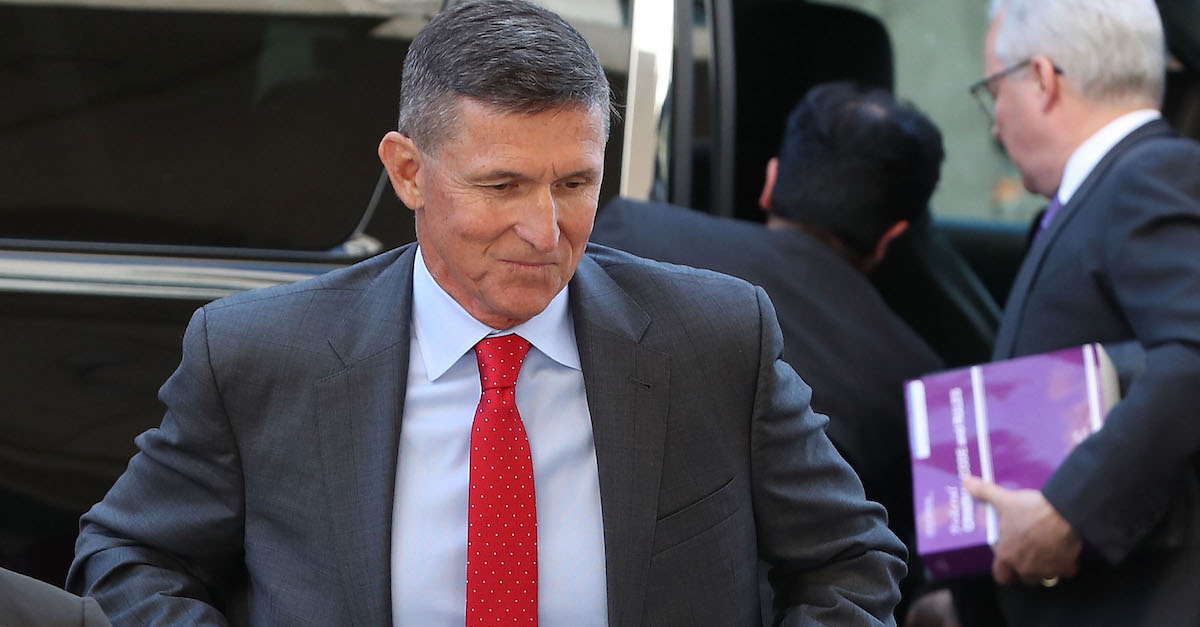
Former national security advisor and retired Lt. Gen. Michael Flynn was the target of pointed criticism on Monday after it was noticed that an old tweet was deleted in which he took “full responsibility” for committing a federal crime.
That since memory-holed statement reads:
After over 33 years of military service to our country, including nearly five years in combat away from my family, and then my decision to continue to serve the United States, it. has been extraordinarily painful to endure these many months of false accusations of “treason” and other outrageous acts. Such false accusations are contrary to everything I have ever done and stood for. But I recognize that the actions I acknowledged in court today were wrong, and, through my faith in God, I am working to set things right. My guilty plea and agreement to cooperate with the Special Counsel’s Office reflect a decision I made in the best interests of my family and of our country. I accept full responsibility for my actions.
Attorney Geoffrey Hickey joined to chorus of criticism by posting an image of Flynn’s initial guilty plea on Twitter, saying, “He can never delete this.”
He can never delete this… pic.twitter.com/wYMmU9V7dT
— Geoffrey Hickey (@gshickey1) April 27, 2020
Avowed opponent of President Donald Trump, George Conway, posted a sarcastic response to the Flynn tweet deletion as well.
A mocked-up version of the Federal Rules of Criminal Procedure outlines the ways a defendant can withdraw their guilty plea.
“A defendant may withdraw a plea of guilty or nolo contendere,” the satirical rules note, “after the court accepts the plea, but before it imposes sentence, by deleting any prior tweet by the defendant admitting guilt.”
“[G]eez, I never knew this,” Conway said.
Flynn struck a plea deal with federal prosecutors in December 2017 after admittedly lying to federal investigators. His admission and promise to cooperate was one of the most high-profile scalps for the probe into election interference and obstruction of justice led by then-special counsel Robert Mueller.
Flynn’s cooperation ultimately proved to be of questionable value to Mueller’s team as the entire Russiagate investigation largely ended with a whimper in early 2019 without prosecutors acting on the theory–and Flynn-supplied evidence–that the White House had improperly raised the possibility of a presidential pardon to prevent his testimony as part of a pattern to obstruct justice.
An ultimately-un-used government sentencing memo noted: “[Flynn] or his attorneys received communications from persons connected to the Administration or Congress that could have affected both his willingness to cooperate and the completeness of that cooperation.”
But things began to unravel for the defendant himself almost a year to the day after signing his original statement of culpability.
At a sentencing hearing in December 2018, U.S. District Judge Emmet Sullivan caused an uproar when he suggested that Flynn had committed treason. He had not. And Sullivan was quickly forced to backtrack. But the judicial outburst was widely viewed as a signal that Sullivan was perhaps unwilling to play ball with Mueller’s light sentencing recommendation.
“Arguably, you sold your country out,” the judge told the defendant.
Cooperation between the defendant and the federal government was subsequently scuppered–as was Flynn’s legal team leading up to the courtroom contretemps–in favor of “a more combative, anti-Mueller approach.”
Proceedings grew increasingly contentious and bizarre from there.
In September 2019, Flynn’s new defense attorney Sidney Powell claimed that the government had knowingly withheld exculpatory evidence in violation of the Constitution.
Prosecutors shot back in October 2019–claiming that Flynn wasn’t really mounting a cognizable legal defense at all but was, instead, simply “advancing conspiracy theories” suggested by Rep. Devin Nunes (R-Calif.).
A slew of back-and-forth motions were filed between the defense and the prosecution. For a while, Flynn held onto his admission of guilt–while simultaneously pushing forward with claims that his rights were violated by the government and moving for the charges to be dismissed.
Finally, in January of this year, Flynn withdrew his guilty plea.
But the prosecution had moved on as well; what was once an agreement for basically no punishment eventually morphed into the government recommending that Flynn spend six months in a federal prison.
Then, in February, the by-then predictable occurred. Attorney General William Barr assigned an outside prosecutor to review the circumstances of Flynn’s initial interview with the Federal Bureau of Investigation. Many legal expert believe that Barr’s Department of Justice will whitewash the Flynn investigation and suggest the charges be dropped.
A nonprofit government accountability watchdog later filed a complaint accusing Barr of unlawfully interfering in the Flynn prosecution–but that plea is unlikely to alter the trajectory of the case.
Also earlier on Monday, President Trump retweeted a claim by Fox News host Maria Bartiromo that claimed Flynn would be “completely exonerated” later this week.
[Image via Mark Wilson/Getty Images]
[Editor’s note: This article has been updated. An incorrect author was originally named.]